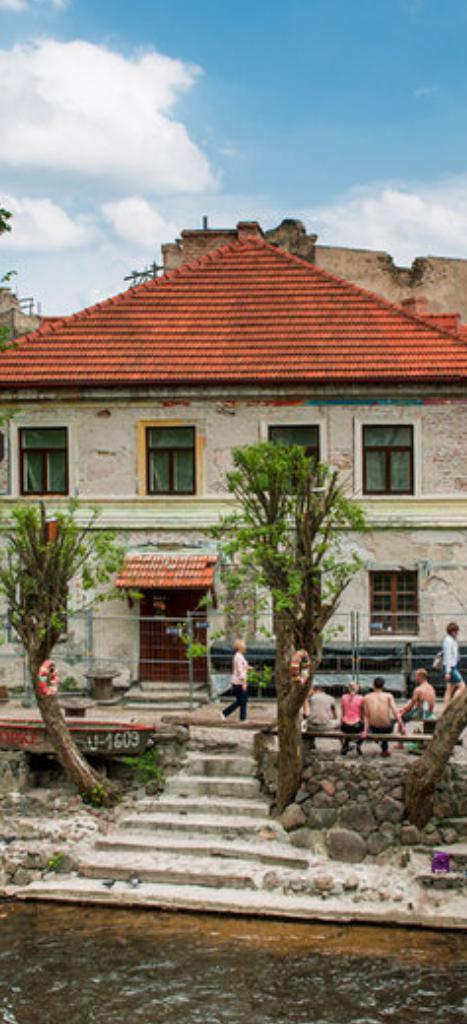
UZHUPIS_with_thanks
.pdf
ARTICLE 5 OF THE CONSTITUTION STATES
« A PERSON HAS THE RIGHT TO INDIVIDUALITY »

FIGHT BOREDOM
Article 5 of the Constitution states "A person has the right to individuality”" Others are more peculiar: a typical example can be found in Articles 1 (“People have the right to live by the River Vilnelė, while the River Vilnelė has the right to flow past people.”), 12 (“A dog has the right to be a dog.”) and 37 (“People have the right to have no rights.”), each of which makes an unusual apportionment of rights. There are a number of paired articles, such as Articles 16 (“People have the right to be happy.”) and 17 (“People have the right to be unhappy.”) which declare people’s right to either do or not do something, or to be or not to be someone, according to their desire.

However, the "Constitution of the District", translated into 20 world languages and posted on mirror plates on one of the streets— is just a landmark, and not a document with real legal force.

Uzhupis is fully subject to Lithuanian law and pays all taxes to the city treasury. In 2013, representatives of this quarter began negotiations with the Lithuanian government on the creation of a special economic zone in the area, specifically on the abolition of taxes on the creation of "creative enterprises and industries". But so far the authorities are not going to meet the creative class halfway

Uzhupis Foreign Minister Tomas Čepaitis, one of the micro-nation’s founding fathers, explained that the republic was born from Aristotle’s philosophy that any great city should have a limited number of inhabitants

“We wanted to create our new little country based on the old thought that a good country can have no more than 5,000 citizens, because the human mind can’t remember more faces,” he said.
“Everybody knows everybody, so it’s hard to cheat and hard to manipulate each other.”

The republic’s flag sports what’s known as the ‘Holy Hand’: a blue hand with a hole in the middle, making it unable to accept bribes.
“The main thing is we have nothing to hide in our hands,” Uzhupis Tourism Minister Kestas Lukoskinas, who has lived in the area for 18 years, told me.

THE UZHUPIS CONSTITUTION TERMS
WITH RUSSIAN TRANSLATE

1.Everyone has the right to live by the River Vilnele, and the River Vilnele has the right to flow by everyone.
2.Everyone has the right to hot water, heating in winter and a tiled roof.
3.Everyone has the right to die, but this is not an obligation.
4.Everyone has the right to make mistakes.
5.Everyone has the right to be unique.
6.Everyone has the right to love.
7.Everyone has the right not to be loved, but not necessarily.
8.Everyone has the right to be undistinguished and unknown.
9.Everyone has the right to idle.
10.Everyone has the right to love and take care of the
cat.
11.Everyone has the right to look after the dog until one of them dies.
12.A dog has the right to be a dog.
13.A cat is not obliged to love its owner, but must help in time of nee.
14.Sometimes everyone has the right to be unaware
of their duties.
15.Everyone has the right to be in doubt, but this is not an obligation.
16.Everyone has the right to be happy.
17.Everyone has the right to be unhappy.
18.Everyone has the right to be silent.
19.Everyone has the right to have faith.
20.No one has the right to violence.
1.Человек имеет право жить возле речки Вильняле, а речка Вильняле – протекать возле человека.
2.Человек имеет право на горячую воду, отопление зимой, и черепичную крышу.
3.Человек имеет право умереть, но это не вменяется ему в обязанность.
4.Человек имеет право ошибаться.
5.Человек имеет право быть одним единственным.
6.Человек имеет право любить.
7.Человек имеет право не быть любимым, но необязательно.
8.Человек имеет право не быть великим и известным.
9.Человек имеет право лениться или ничего не делать.
10.Человек имеет право любить кошку и заботиться о ней.
11.Человек имеет право присматривать за собакой до конца жизни одного из них.
12.Собака имеет право быть собакой.
13.Кошка не обязана любить своего хозяина, но в трудный час должна ему помогать.
14.Человек имеет право иногда не знать, есть ли у него
обязанности.
15.Человек имеет право сомневаться, но это не вменяется ему в обязанность.
16.Человек имеет право быть счастливым.
17.Человек имеет право быть несчастным.
18.Человек имеет право молчать.
19.Человек имеет право верить.
20.Человек не имеет права на насилие.

21.Everyone has the right to appreciate their unimportance.
22.No one has the right to have a design on eternity.
23.Everyone has the right to understand.
24.Everyone has the right to understand nothing.
25.Everyone has the right to be of any nationality.
26.Everyone has the right to celebrate or not celebrate their birthday.
27.Everyone shall remember their name.
28.Everyone may share what they possess.
29.No one can share what they do not possess.
30.Everyone has the right to have brothers, sisters and parents.
31.Everyone may be independent.
32.Everyone is responsible for their freedom.
33.Everyone has the right to cry.
34.Everyone has the right to be misunderstood.
35.No one has the right to make another person guilty.
36.Everyone has the right to be individual.
37.Everyone has the right to have no rights.
38.Everyone has the right to not to be afraid.
39.Do not defeat.
40.Do not fight back.
41.Do not surrender.
21.Человек имеет право осознавать свое ничтожество и величие.
22.Человек не имеет права покушаться на вечность.
23.Человек имеет право понимать.
24.Человек имеет право ничего не понимать.
25.Человек имеет право быть разных национальностей.
26.Человек имеет право справлять или не справлять свой день рождения.
27.Человек обязан помнить свое имя.
28.Человек может делиться тем, что имеет.
29.Человек не может делиться тем, чего не имеет.
30.Человек имеет право иметь братьев, сестер, и родителей.
31.Человек может быть свободным.
32.Человек отвечает за свою свободу.
33.Человек имеет право плакать.
34.Человек имеет право быть непонятым.
35.Человек не имеет права обвинять других.
36.Человек имеет право на частную жизнь.
37.Человек имеет право не иметь никаких прав.
38.Не побеждать.
39.Не защищаться.
40.Не сдаваться.
